 Petzlover
Petzlover Balinese is originated from Thailand but Chantilly/Tiffany is originated from United States. Both Balinese and Chantilly/Tiffany are having almost same weight. Balinese may live 4 years more than Chantilly/Tiffany. Both Balinese and Chantilly/Tiffany has same litter size. Both Balinese and Chantilly/Tiffany requires Low Maintenance.
Balinese is originated from Thailand but Chantilly/Tiffany is originated from United States. Both Balinese and Chantilly/Tiffany are having almost same weight. Balinese may live 4 years more than Chantilly/Tiffany. Both Balinese and Chantilly/Tiffany has same litter size. Both Balinese and Chantilly/Tiffany requires Low Maintenance.
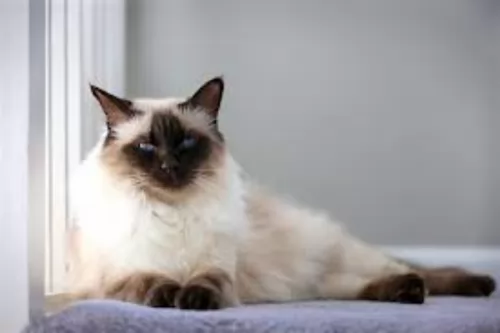 The slender Balinese cat is a cat similar in looks to the Siamese cat but fluffier. In fact, in the 1950s, Siamese breeders in the United States discovered that the kittens were fluffier than what a Siamese cat should be.
The slender Balinese cat is a cat similar in looks to the Siamese cat but fluffier. In fact, in the 1950s, Siamese breeders in the United States discovered that the kittens were fluffier than what a Siamese cat should be.
The fur was too long to conform to Siamese cat standards. Two Siamese breeders, Helen Smith and Marion Dorsey loved the look of the longer-haired Siamese with the idea being to name the breed the Longhair Siamese. Siamese breeders didn’t want this and the name became Balinese.
The Balinese cat has been recognized by many cat registries and associations.
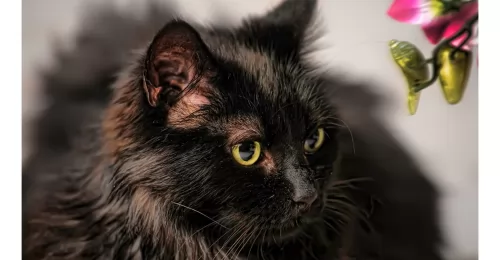 The beautiful Chantilly/Tiffany cat gets people thinking the cat is a semi-longhaired Burmese, but of course, it's not.
The beautiful Chantilly/Tiffany cat gets people thinking the cat is a semi-longhaired Burmese, but of course, it's not.
The way the Chantilly came about was that there were a pair of chocolate-colored cats but their origins were unknown. The first litter of Chantilly kittens was born in New York in 1969 and people were so taken up by the beautiful kittens that a breeding program was started.
The cat was first started as a foreign longhair and then it changed to Tiffany. In a British registry, a cat breed that was a cross between a Chinchilla Persian and a Burmese was named the Tiffanie and renamed Chantilly and referred to as the Chantilly/Tiffany.
The breed is recognized by most major cat registries.
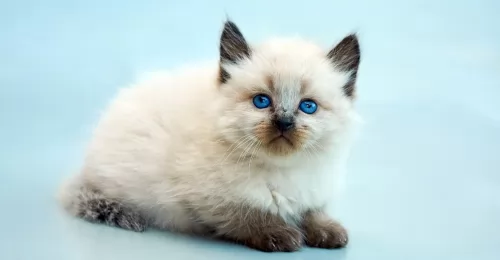 The medium-sized Balinese has a long, slender, finely built body with the head being long and triangular.
The medium-sized Balinese has a long, slender, finely built body with the head being long and triangular.
The eyes of the cat are slanted and a deep blue.
The coat is medium in length and is soft and silky without an undercoat. The coat length is pretty much all that distinguishes this cat from the siamese cat. The coat is pointed which means you’ll find concentrations of color – cream, red and tortoiseshell on the face, ears, legs and the plumed tail.
Your Balinese is a talkative cat and he is active and playful too. Because it is such an intelligent cat, it can learn tricks too.
They are affectionate cats and bond closely with their human family. They crave lots of attention and don’t like being left alone for long periods of time. They’re chatty cats too and love to leap up onto high perches and look down on their world.
If you have a Balinese as a pet, you will certainly have to invest in climbing equipment.
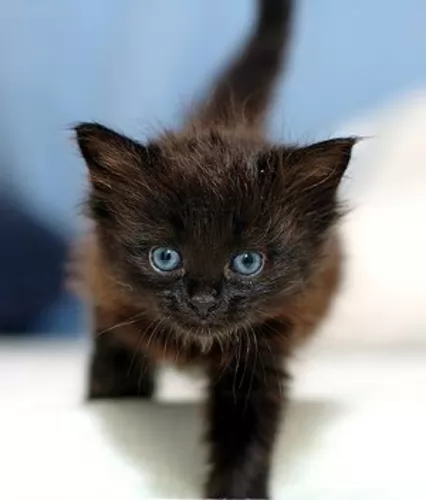 The cat has a fairly broad head with widely spaced ears of medium size. The eyes are oval-shaped and gold in color. The fur is semi-long and there is no undercoat. The tail is plumed.
The cat has a fairly broad head with widely spaced ears of medium size. The eyes are oval-shaped and gold in color. The fur is semi-long and there is no undercoat. The tail is plumed.
Apart from the original chocolate brown of the cat, other colors of the coat can include fawn, cinnamon, black, lilac and blue, with the chocolate brown being the favorite color.
The Chantilly promises to be a devoted and loyal feline companion for you, much preferring the company of his human family than to being alone.
It gets on well with other pets in the house as well as with respectful, gentle children. He isn't a demanding cat and he tries to talk with his family by chirping. It’s a balanced cat, with a fair share of docility and energy, making the cat an ideal companion for single people, couples, families, and elderly people.
It’s a cat that is so devoted, it will follow his human family around the house.
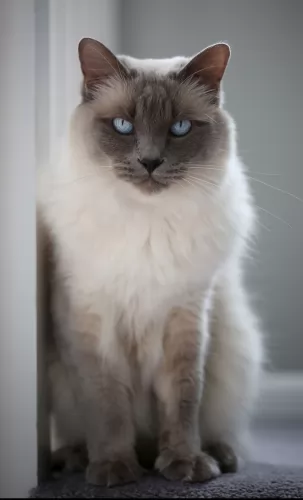 Your Balinese cat is a friendly, affectionate cat that will bond closely with his human family.
Your Balinese cat is a friendly, affectionate cat that will bond closely with his human family.
They’re the kind of cats that enjoy having their family members around them and they don’t like being left alone for long periods.
He is a playful cat so make sure that he has some nice toys that will keep him amused. They’re known for their intelligence and their inquisitive and playful natures, not to mention that these cats are easy on the eye as well.
Vocal and demanding, if you want someone who demands your friendship, then take a look at these beautiful Balinese cats.
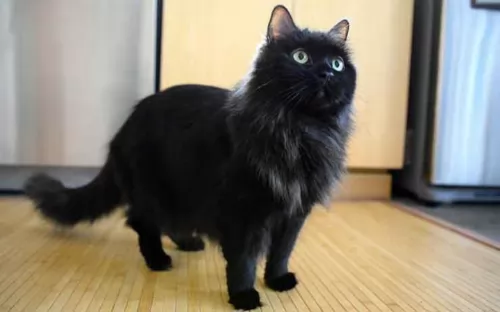 The Chantilly/Tiffany is a gentle and kind breed that is playful and easy-going. They are just your typical middle-of-the-road cats that are not too much or too little of anything.
The Chantilly/Tiffany is a gentle and kind breed that is playful and easy-going. They are just your typical middle-of-the-road cats that are not too much or too little of anything.
The Tiffany is playful, docile, happy and content and he wants to be your friend and companion.
If you are looking for a breed of cat that is loyal to its human family, allow this cat into your home... you won't have any regrets.
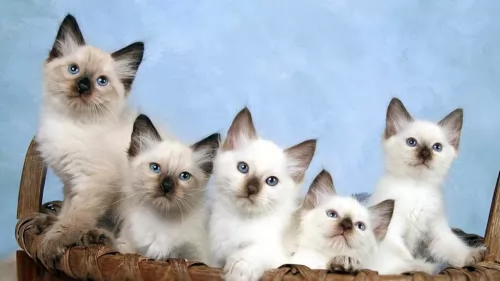 Balinese cats are fairly healthy and any health problems these cats may have are much the same as those for the Siamese cat.
Balinese cats are fairly healthy and any health problems these cats may have are much the same as those for the Siamese cat.
You want to look at diseases such as respiratory illnesses, liver failure, dilated cardiomyopathy, and eye problems.
In fact, Progressive Retinal Atrophy is one health condition that you see quite a bit with the Balinese cat.
It can be an inherited eye disease or one that is acquired. PRA is a degenerative disorder of the retina and you will need to get your cat to the veterinarian. Unfortunately, there isn’t a treatment for PRA and therefore breeders need to check their breeding stock before allowing cats to be bred.
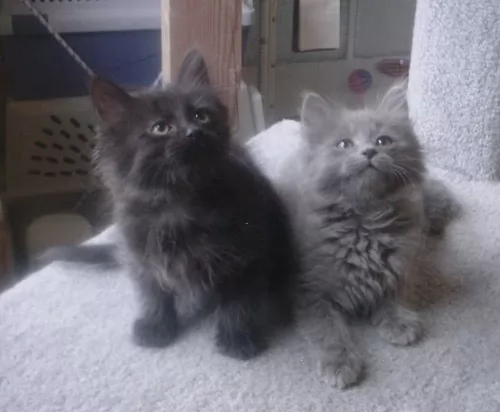 There is no health issue that the Tiffany is prone to. Like any cat, a healthy diet will keep the Tiffany healthy for years.
There is no health issue that the Tiffany is prone to. Like any cat, a healthy diet will keep the Tiffany healthy for years.
These cats are known to have delicate digestive systems so avoid foods with grain if possible. The Tiffany has full hair in their ears, and wax build-up can occur so the inside of his ears must be checked. Checking the ears once a week, as part of a regular routine that includes brushing, and tooth care, should be sufficient to keep the ear canals clear.
Other issues, which are not detrimental but should be kept in mind, are reports that the Tiffany has delicate digestion. This cat relies on a regular diet that doesn't chop and change often.
Because the Tiffany is a low-shedding cat, it is thought to be a popular breed with those people who are allergic to cat hair.
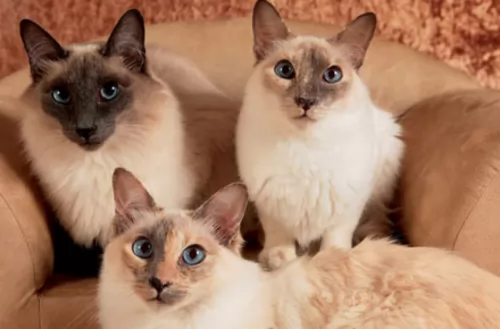 Your health depends on what you eat, and the same applies to cats too. Apart from good veterinary care for your cat, good food is of critical importance. A proper diet can eliminate veterinary expenses substantially.
Your health depends on what you eat, and the same applies to cats too. Apart from good veterinary care for your cat, good food is of critical importance. A proper diet can eliminate veterinary expenses substantially.
In feeding your cat, learn to read cat food labels and make sure your furry friend is getting the right amount of proteins, vitamins, and minerals.
There are many choices of cat foods – homemade and commercially manufactured cat foods which can be canned or you also get the dry cat kibble type of food.
If your furry friend doesn’t like a particular food, don’t punish him by taking it away and leaving him without food. Your mom tried you with different foods and you should do the same with your feline friend.
Provide your Balinese with ‘cat equipment’ - feeding and drinking bowls, grooming equipment and a nice, soft bed for him to lie in and in a quiet place.
Keep your pet’s vaccines up to date and see he gets to the vet when he is ill.
The Balinese has a coat of medium length and because the cat only really sheds seasonally, it is looked upon as a low-maintenance coat. A brush once a week will get rid of dust as well as loose, dead hair and keep the coat in good condition.
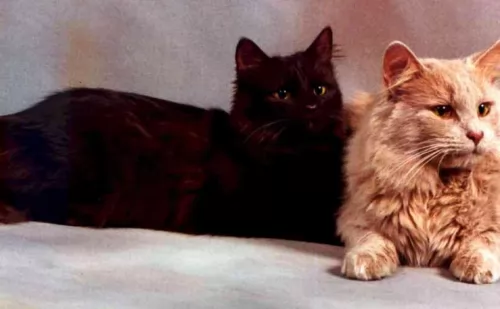 The Chantilly needs an excellet diet and exercise to ensure he doesn’t become to overweght. Remember that cats are carnivores, and this means they have nutritional requirements that can only be met with meat – they can never do well on a diet high in carbohydrates and will develop digestive problems. Your cat will also require clean, fresh water aroud thd clock to ensure his good health.
The Chantilly needs an excellet diet and exercise to ensure he doesn’t become to overweght. Remember that cats are carnivores, and this means they have nutritional requirements that can only be met with meat – they can never do well on a diet high in carbohydrates and will develop digestive problems. Your cat will also require clean, fresh water aroud thd clock to ensure his good health.
Ensure each cat you have has a litter box andencourae good litter box habits by cleaning th litter box every day. Keeping the litter box clean also alerts you anything unusual with your cat’s toilet habits.
Provide your cat with a scratching post and a climbing tree.
The cat doesn’t have an undercoat and is therefore easy to groom. With his semi-long hair, you can brush him once a week to keep the coat soft and shiny. The coat is also low shedding.
Check inside his ears and inside his mouth to ensure there is no redness and signs of infection.
Schedule regular vet visits for your cat for his cat vaccines and for when he is sick.
Spay or neuter your cat to prevent unwanted kittens. Spaying and neutering prevents uterine infections and certain cancers in the felines.